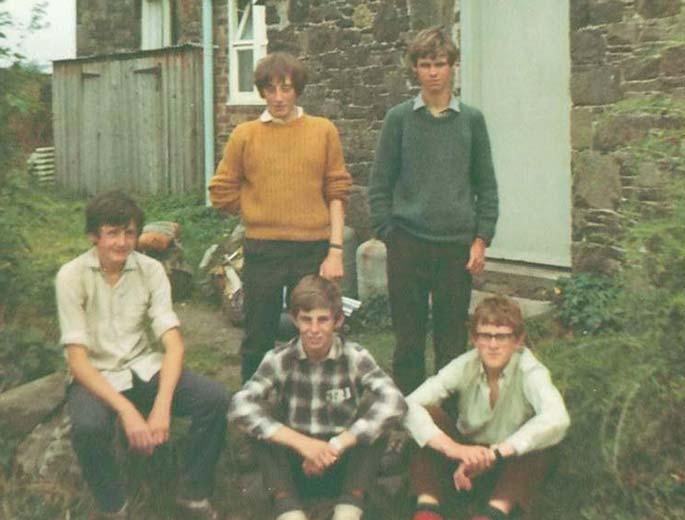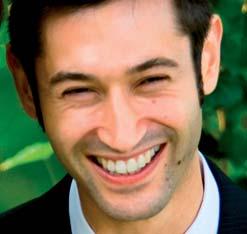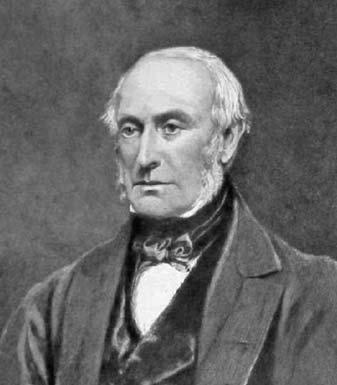
10 minute read
School Camps –The 1960s
from ONA 85
School Camps The1960s

Advertisement
Our series of school camps continues into the 1960s. Paul Haggie (60-67) reflects on how camping changed during the decade
Eskdale 1964: Martin Rutherford, MIke Barlow and Herr Emers (German exchange teacher) plotting a rouse up Scafell Pike
The sixties saw the twilight of traditional, technology-free camping. At the beginning of the decade, we still utilised the same heavy canvas bell-tents that our forefathers would have recognised from the Boer War –or even the Crimea. The ancient oval dixies too, placed on angle-iron supports over wood or coal fires would have been familiar to earlier generations, as would the heavy wooden trestle tables for the manufacture of sandwiches on an industrial scale. Add in some serious enamel serving equipment, shovels and a pickaxe (pit latrines for the digging thereof) and you had the complete kit.
Travel arrangements likewise reflected the twilight of British Rail in all its post-war, seedy steaminess. Grimy expresses took us to places like Thirsk or Northallerton where we would debouche with all our paraphernalia into local buses –or, in the case of Eskdale, for some odd, traditional reason, a coal wagon from Drigg. We’d then proceed to sing until the driver’s ears bled –again songs our forefathers would have sung, some originating in the trenches of the Great War.
Once we arrived on site there was a delicious sense of isolation. With the railway station miles away, once the local transport had deposited us in our chosen field, the outside world effectively ceased to exist for a week. No radios, no mobile phones, no iPods. The GPO phone box in the village for emergencies and the daily papers, when they finally arrived at the local village store, represented our only links with the outside world –as indeed they did for the local inhabitants. Even pop music was still in its infancy. At Swaledale in 1962 I recall Mr. Howarth, a rather formal young Languages Master who had clearly had a sheltered upbringing, being convinced that Mike Sarne’s popular hit Come Outside was in fact entitled ‘Gunnerside’. By the time we reached Eskdale in ‘64, all that had changed. Clandestine Radio Luxemburg after lights out on early, battery-crunching transistor radios was the norm, and the songs we had sung with such gusto just a year or two before were as dead as the Dodo. It was a vivid example of how swiftly a bit of popular culture can be totally expunged.
A decade later the bell tents and dixies were still in evidence. But our sacks of coal had been replaced by the vaguely controllable primus stove. Coach travel from door to door had replaced the ritual of assembly under the Central Station clock. And instead of a motley collection of woollen jerseys and the odd school raincoat doing double duty, jeans and anoraks had entered our lives, along with footwear rather more adapted to squelching across moorland and scrambling over scree than plimsolls or hobnailed shoes.
These external changes were, however, superficial compared with the changes in outlook and expectation of the participants. In the early 60s a school camp was often the first time we had escaped from the protective cocoon of the parental holiday. A first taste of relative freedom. For many town-bred boys it was the first time they had come close to real nature. To swim in a beck rather than a swimming pool. To discover the perils of boggy moorland, the frustration of climbing only to reach a false summit and the exhilaration of finally reaching the real thing.
By the end of the decade, it seems doubtful whether camps still represented the first slipping of the parental leash, and certainly that sense of slightly exotic isolation was gone. The natural world was on TV in our living rooms. And, most significant of all, foreign travel was now within the reach of ordinary family budgets. The idea of spending a week in a field not that far from home no longer seemed as strange or adventurous as it undoubtedly did to my generation.
The school, as usual, adapted with commendable speed. We were given the opportunity to ski in Switzerland, and to visit Athens and Cephalonia. Both trips were led by Gordon Forster, and it was not the least of ‘Rocky’s’ considerable services to the school to have brought us through these experiences relatively unscathed –two broken legs out of a skiing party of 18 being regarded as an acceptable casualty rate. However I’m sure he hadn’t envisaged challenges such as reviving one of our number who had imbibed so freely on the cross-channel ferry that he’d passed out in the heads, or extricating another from the clutches of the Italian railway police, who were less than impressed at the fine collection of warning notices he had unscrewed from the interior of our train.
Recalling the Greek trip brings home how quickly we have become accustomed to the smoothness of modern international travel. Our journey to Athens in 1965 began with a cross channel flight from Newcastle in an ancient, prop-driven Vickers Viking. Thirty minutes into the bumpy flight the sole stewardess emerged from the cockpit area into the cabin to pass around a handwritten note from the From Bruges we went by train though France and Switzerland to the Italian port of Ancona. Here we boarded a venerable vessel bound for Piraeus. It was the first in a series of maritime antiques. Our ferry to Cephalonia had spent the best years of its long life as a cross-Channel packet, whilst our return voyage from Piraeus was on an ex Bibby liner of 1930s vintage whose crew accommodation now constituted our ‘tourist’ class and whose current crew appeared to live in a kind of galvanised iron hut erected on the stern.
All of the above may have seemed much more adventurous and modern than our muddy field in Ryedale of just four years previously. There remained, however, something about the camping experience that foreign travel could not replicate. Staying in hotels or, on Cephalonia, with villagers in Sami, could not compare with the experience of looking after - and cooking for ourselves. The controlled version of Lord of the Flies that constituted RGS camping still remained the best and most fun environment for developing those skills we acquire through living in close proximity with one another, helping with communal chores and sharing physical challenges. In the process we learned much about ourselves, and we owe a huge debt to the staff who created the camp ethos. It was undoubtedly the key to their ability to ride the sixties cultural watershed and emerge, still flourishing, into the seventies.
Wendsleydale 1966: Larry Watson, John Hempson and Peter Wolstenholme


Mike Barlow (53-64) writes: My first experience of camp was on Arran, four years as a pupils and then another two as an Old Novo. Many changes happened during this time, the main one was probably the cooking over open coal fires was superseded by Primus stoves (which I think Larry Watson introduced), and then by Calor gas. The wartime dixie remained the main cooking pot, however, and still was when I left the staff at RGS in 1995 for pastures new.





My first memories at Ryedale were of Tucker Anderson crouched over the glowing embers at 5am in the morning, blowing gently on them to make sure the fire was going well enough to produce porridge for 30 odd at 8am. Other memories include hurtling down the hill at Dentdale from the station on the Carlisle – Settle line into the village in a cattle truck with all the equipment rattling around us, together with the remains of the last cargo! At the same camp Don Peden spent much of his time when it went dark signalling to another ex-member of the Signal Corps who lived in the village. We never did discover what was said.
As primus stoves made their appearance on Arran, so did the strange assortment of clothing worn by staff; the most startling was Peter Stephenson’s sudden appearance with corduroy shorts. We had just alerted the staff to the fact that one tent had acquired a strangely falsetto voice and seemed to be playing strip poker! The intruder was left to walk back to Brodick in the dark. Strangely no one offered to be escort.
The one major change at camp during my time was the switch from tinned food to fresh or frozen food: below is Geoff Swinden’s picture of teacher David Walton taking an axe to a delivery of frozen meat at Littondale.
Once I had finished college and it became known I was working in the north east I was roped in as the ON at Border camp by “Spuggie” Douglas, and from then on I continued to attend camp, as an ON, and later as one of the RGS staff.
Chopping up meat for dinner at Littondale Top: Wensleydale 1966 –packed lunch ready for distribution. Alan Mitchell supervising. Bottom: Littondale 1968 –Porridge. Toby Ibbotson supervising


Iain Mackinnon (65-74) concludes with his memories of camp: I had a wonderful time at a succession of school camps, starting with Swaledale in 1969 (when I was in III.2) and concluding with two trips to Eskdale, in the fifth form and again as a sixth form helper.
What do I remember? Walking in wonderful countryside, stopping to stock up on essential rations in Grinton and Reeth, making vast numbers of sandwiches with sandwich spread on white bread (this was the 1960s!), washing our plates in the horse trough at the far side of the field, and someone calling out throughout the night: “2 o’clock and all’s well” (with variants at 3, 4, 5 and 6am). I also remember my first introduction to the curious fact that teachers have more to offer than simply what they do in a classroom, when Alan Mitchell organised a game of rounders!
One phrase from Swaledale 69’ camp lives on in my family. One of the sixth formers burnt the porridge one morning and, taking his inspiration from the novelty varieties of crisps which were then still new to us all, called out that porridge that morning was “smoky flavoured”. More than 40 years later, should anything burn in our kitchen even my children now describe it as “smoky flavoured”.


It’s a terrible shame that exam preparation gets in the way and the camps no longer run. I am a non-executive director of one of the big exam boards (Edexcel) so I’m hardly going to say that exams aren’t important, but the camps offered a completely different form of education, and I loved my weeks away at camp. What a missed opportunity.
(Editor’s note: The last week of summer term is annual camping week for all Year 7 pupils, with staff and sixth formers helping out. So despite the long and often frantic exam season, the school has managed to keep some of the camping spirit going!)








